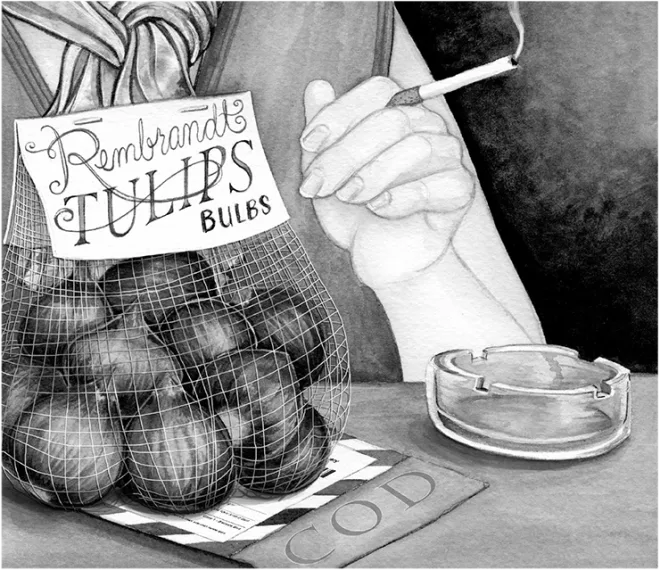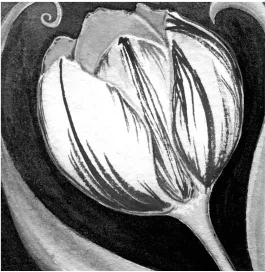
My Aunt Irene was not a gardener. Oh, she’d wander outside occasionally, but not to see the garden. She did it to get a moment to herself. She was the stay-at-home caregiver in the little house we shared with my grandparents and another aunt, Imogene. Babysitting me, tending to my grandparents’ needs, and housekeeping were her life’s work.
Her great gardening experience started innocently enough the summer I was smitten by a Breck’s bulb catalog.
We lived in southern California, so my flower world consisted of Aunt Imogene’s roses and the blooms of the single hibiscus, gardenia, and camellia shrubs that graced our small yard. I also frequently saw magenta bougainvilleas in full glorious bloom in others’ yards. So tropical and semi-tropical plants were a little commonplace to me. I had never seen anything like the daffodil and other bulbs that graced the catalog’s pages. But of them all, the picture of the Rembrandt tulip collection stole my seven-year-old heart. The large flowers, the flared petals. The explosive mixtures of colors: scarlet and butter yellow, maroon and cream, inky purple and pale primrose, raspberry and icy white. Some of the tulips were only lightly fringed by their contrasting color, while others were swirled and feathered in such abundance it was impossible to tell the base color from the overlay.
I tried to get excited about the windflowers or the daffodils, and the Little Red Riding Hood tulip caught my attention for about five seconds. But I kept going back to those Rembrandt tulips.
I had to have them. And thanks to the now-extinct postal service of C.O.D. (cash on delivery), I could have them without troubling my elders. Using my best block printing, I filled in the order form letter by letter with my name and address. I marked an X on the order form next to Rembrandt Tulip Collection, and, exercising great control, I filled in “1” for the number of collections. Finally I marked the C.O.D. box with a dark and definite X, going over it several times for emphasis. I put a well-licked stamp on the order envelope, then clothespinned it to the mailbox.
What was Aunt Irene doing at this time? As was her custom, she was sitting at the kitchen table in her faded housecoat, smoking a cigarette, drinking black coffee, and looking out the window at the comings and goings on our street. She feigned interest when I showed her the picture of the tulips, but I knew my excitement wasn’t shared.
Toward the end of the summer (a summer memorable only for my anticipation of the tulip bulbs), our world changed. My single working mom arrived from Nevada to move me to her home in time to start the new school year. My belongings were packed and, with tears in my eyes, I gave good-bye hugs to everyone who had raised me to that point, chief among them Aunt Irene. I knew I was moving far away and wouldn’t see them again until the following summer. I forgot all about the tulip bulbs.
In October, out of the blue, Aunt Irene called me. “You got a package, Sweetie. Shall I open it or send it to you?” I asked her to open it to find out the contents. After a moment, she came back on the line. “The package says ‘Rembrandt Tulips’ and there are 12 of them. They’re brown. What do you want me to do with them?” Her voice had lost its earlier excitement. I heard her take a drag on her cigarette. But my interest in tulips had been diminished by the upheaval in my life, so I said, “You plant them, Aunt Irene. Maybe I can come visit in the spring to see them.” (An unlikely possibility, I knew.)
Sounding less than thrilled, she agreed to do something she had never done before: Plant something in the dirt. “I can put them in that little patch next to the backyard patio where Mama used to grow mustard greens.”
So Aunt Irene planted the tulips. I imagined her grumbling a bit as she rooted around in the garage to find a seldom-used trowel. I pictured her with a cigarette in one hand and a watering can in the other, distractedly but dutifully watering my tulip patch.
A few letters and phone calls passed between us over the winter. The conversations always included the tulips: whether there were any signs of life (“No, not yet.”) and if they would look as pretty as the picture in the catalog (“Kerry, I bet they’ll be even prettier.”). Then, mid-spring, I got a letter: “I see tulip leaves coming up. They’re pointy and there’re lots of them! No rain lately so I’ve been watering them.” This from someone who I had never seen pick up a hose or watering can. From then on, I got weekly updates by letter and occasional phone calls. “The leaves are up six inches.” “You know, I can see little green flower buds in the middle of the leaves.” “The stems are getting really tall.” And most exciting of all: “The buds are starting to turn colors!”

About a week after that announcement, I got a phone call from Aunt Irene: “Oh, Sweetie, I wish you could see these tulips. They’re all in bloom, and they’re the prettiest thing I’ve ever seen. They’re all colors. Some have red stripes on white, some are yellow on purple, some have their colors all mixed together. But my favorites are kind of a creamy white on rosy-pink. I sit on the porch and just look at them in the sun.”
I had never heard such excitement in Aunt Irene’s voice. She continued, “I invited some of the neighbors over to see them, and they’d never seen anything like them, either. Your tulips have created quite a stir.”
I felt I was there with her that special spring as she described the dazzling flowers and the rare event of having neighbors in the backyard. I imagined their voices and happy chatter breaking the usual garden silence.
The next year was a letdown. Aunt Irene was so disappointed when just a few leaves emerged and a couple of stunted buds. Nothing would ever match the glory of that first spring bloom. We talked about the tulips for years after. It was a topic which always lifted her spirits. She was transported by that telling, and I like to think her spirit was lifted to someplace rare and beautiful beyond the lonely kitchen table and the endless coffee and cigarettes.
Today I grow tulips in my high desert Nevada garden, but in softer colors than the Rembrandts. Yet whenever I see them in the garden catalogs, their exuberant colors never fail to bring back memories of Aunt Irene and that single glorious flush of spring bloom. ❖


 Previous
Previous

